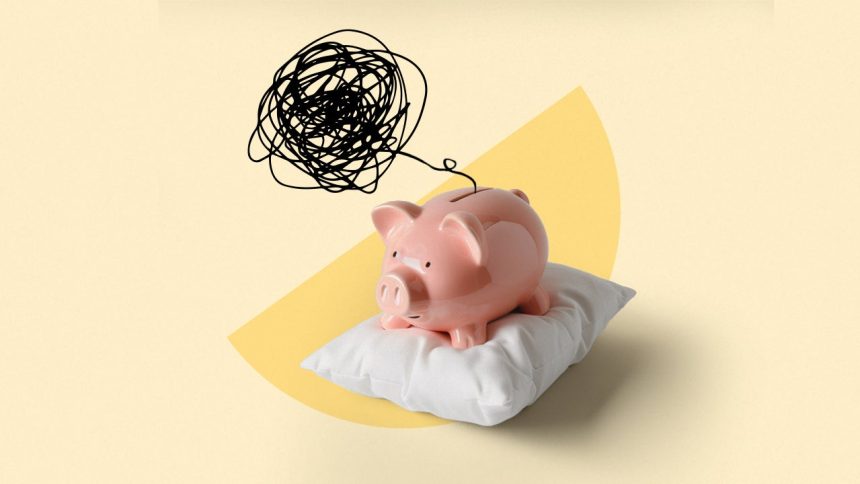Fraught with stubborn inflation, high college costs and signs of a cooling job market, today’s economic environment has taken a toll on many young Americans’ well-being. In fact, 47 percent of Gen Zers (ages 18-27) adults say money has a negative impact on their mental health at least occasionally — including feelings of anxiety,stress, worrisome thoughts, loss of sleep and depression — according to Bankrate’s Money and Mental Health Survey.
High expenses often mean little is left over after one’s bills are paid, which can lead to “soft saving” — a term for the concept of spending money for present-day enjoyment instead of saving for the future.
Fortunately, there are various ways young adults can enjoy a full life while still spending within their means and setting aside money for the future.
Money negatively impacts mental health of nearly 1 in 2 Gen Zers
Nearly half (47 percent) of Gen Zers report money has a negative impact on their mental health, at least occasionally, according to Bankrate.
Gen Zers also said other factors have a negative impact on their mental health, such as work, health, current events, relationships and household obligations. Notably, however, nearly 1 in 5 (18 percent) Gen Zers said nothing has an impact on their mental health.
Significant percentages of most other generations reported money negatively impacts their mental health:
- Millennials (ages 28 to 43): 50 percent
- Generation X (ages 44 to 59): 54 percent
- Baby boomers (ages 60 to 78): 40 percent
In all, money was the most frequently reported factor having a negative impact on the mental health of Gen Zers, millennials and Gen Xers. Among baby boomers, the most frequently reported reason was their own health (45 percent).
Paying for everyday expenses causes Gen Zers the most financial stress
Of Gen Z adults who reported having money concerns that negatively impact their mental health, the most commonly reported money concern was inflation/rising prices, which was cited by 50 percent. Other commonly cited concerns included being in debt, not having a stable income/job security, paying for everyday expenses and not having enough emergency savings.
Among those from other generations who noted money negatively impacts their mental health, inflation was the most cited stressor by millennials (69 percent), Gen X (69 percent) and baby boomers (65 percent).
Being decades out from traditional retirement, Gen Zers are less likely than other generations to feel stress over being prepared for their golden years. Among those feeling negative impacts of money on their mental health, 23 percent of Gen Zers cited being unprepared for retirement or a low return on their investments as a concern.
Is soft saving Gen Z’s answer?
When feeling overwhelmed by factors such as high costs of living and student debt, young people sometimes resort to “soft spending.” A trend that recently went viral on TikTok, soft spending involves using one’s money for present-day enjoyment instead of saving it for the future.
Through careful planning and budgeting, however, one can find ways to enjoy life today while still setting aside money for emergencies and future financial goals.
Lauren Zangardi Haynes, a certified financial planner professional, CIMA at Spark Financial Advisors says the biggest pitfall of soft saving is that you’re giving up compounding. “[This] is just something that people aren’t taught in school so they really don’t understand. But when you’re younger, you literally have to save less to meet your financial goals over time.”
Tammy Goodman, a certified financial planner at Tammy Goodman Financial LLC, says that if someone loves being outdoors, yet they’re spending all of their money on indoor sports entertainment events, that might not align with what’s important to them.
“And some people are comfortable spending money in many ways and trying to experience all that they can,” Goodman says. “But then they get enlightened when they really do an inventory of where their money is going.”
Ways to enjoy life now and still save for the future
In today’s world, the concept of money management can easily feel overwhelming. The good news is some planning can help you enjoy your life while still saving money, paying your bills and reducing debt. The following exercises can help you strike a healthy balance.
Create a budget
It may seem like a daunting task, but establishing a budget is the first step in being able to afford your wants and needs. A budget is a monthly spending plan that can be set up using pen and paper, a spreadsheet or a handy budgeting app.
Common types of budgeting methods include the 50-30-20 rule, which involves devoting set percentages of your monthly income to needs, wants and savings. Another method that’s recently gone viral on TikTok is cash stuffing, which involves putting set amounts of money into envelopes to cover each of your monthly expense categories.
Common categories included in a household budget include:
- Rent or mortgage payments
- Transportation (car payment, gasoline)
- Food
- Utilities
- Insurance premiums
- Credit card bill payments
- Student loan payments
- Entertainment
- Streaming services
- Gym memberships
- Saving for emergencies in a high-yield savings account
“A budget sets boundaries around your spending, and tracking your spending against that budget is a way to hold yourself accountable,” says Greg McBride, CFA, Bankrate’s chief financial analyst. “Budgeting and tracking expenses also help you identify areas where cutbacks can be made, if needed. A budget should be ‘written in pencil’ as expenses regularly change, usually more often than income, so adjustments are common from time to time.”
Set financial goals
Financial goals can include planned purchases, debt repayment, having an emergency fund or saving for retirement. Whether you’re starting your career or still working on your education, your future financial goals may include:
- Saving for a down payment on a house or a car
- Paying off student loans or credit card debt
- Starting a business
- Retiring at a set age
Whatever your financial goals are, decide how much you wish to devote to them every month and add each one as a line item to your budget. For instance, you may decide to create line items such as:
- Save $200 toward a car down payment
- Add $100 to your emergency fund
- Send $100 extra to pay down a credit card balance
Even if it’s slow going, making progress toward such financial goals is sure to help provide peace of mind and motivate you to continue in your efforts.
Set nonessential spending priorities
Decide which nonessential items or experiences are important in your life right now. Examples can include traveling, fine dining or pursuing a hobby. Once you’ve defined the things worth spending money on, it can be easier to decide whether any potential purchase is ultimately worth it.
Such nonessential purchases can be made with money left over after you’ve covered your essentials such as housing, transportation and other living expenses. Like your financial goals, set aside money in your budget for this type of spending.
“A budget should incorporate all expenses — those incurred on an irregular basis as well as the discretionary, or fun, things you spend on,” McBride says. “Holding yourself accountable by tracking spending is important because if you regularly go overboard on discretionary spending, it will be a barrier to saving or a catalyst for high-cost debt.”
Bottom line
Today’s economic challenges are hitting many consumers hard — including young people, who often struggle with high costs of living, saving for a home and paying off student loan debt. As such, many are embracing the concept of soft saving by spending money now instead of saving for the future.
Ultimately, striking a balance between spending and saving is key, and this involves creating a categorized monthly spending plan. This helps you live within your means, with benefits of financial security, lowered stress and more peace of mind.
Read the full article here
















